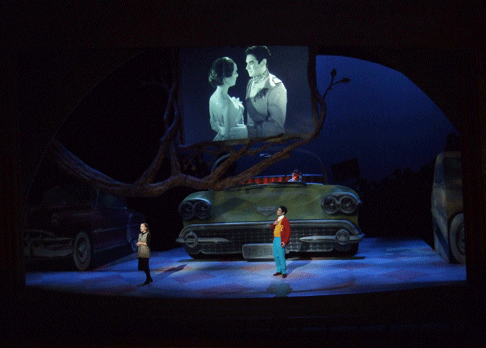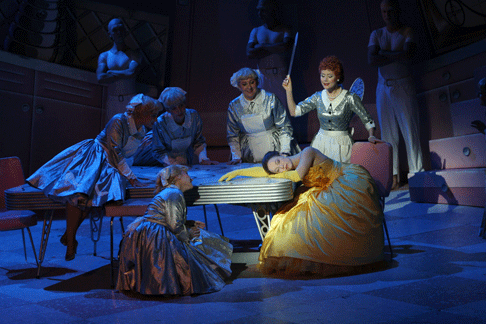07 Jan 2010
Cendrillon in Marseille
Rare repertory but not truly rare, Massenet’s Cendrillon makes an appearance from time to time.

Rare repertory but not truly rare, Massenet’s Cendrillon makes an appearance from time to time.
One of the more notable recent revivals occurred at the Opéra National du Rhin (Strasbourg) in 2003 in the mise en scène of French born director/choreographer Renaud Doucet and Canadian designer André Barbe. The production is well traveled, including a stopover at the New York City Opera two years ago, and just now it was again revived in a splendid evening in Marseille (December 29.)
This staging team is far better known in the U.S. and Canada than in Europe, in fact the entire 2009-2010 four opera season of Florida Grand Opera (Miami) consists of stagings by Messieurs Doucet and Barbe. Was it not in the 1950’s that the exodus to Florida began?
The Doucet/Barbe Cendrillon looks backwards at the fabulous American 50’s, our out-sized and shiny kitchen appliances, our long and sleek automobiles, the giant juke boxes and the big screens for our Hollywood movies. Like all French glances at the U.S. this one too is vaguely anti-American, rubbing it in that though we may have all these flashy contraptions we do not have royalty and titles — i.e. breeding, that which money cannot buy.
Thus at the center of the Doucet/Barbe production is the American princess, Grace Kelly whose kingdom, Monaco, is just down the road from Marseille, and whose fairy tale royal marriage filled the giant black and white movie screen suspended from a branch of Massenet’s giant, magical third act oak tree. The coloratura incantations of Cinderella’s fairy godmother had brought the Prince and Cinderella together for a vocally sumptuous if chaste seduction scene at the drive-in movies.
The Doucet/Barbe production wore its concept like the skin-tight, low-cut gown of the 1953 Calendar girl hanging above the juke box. Cinderella, here named Lucette, emerged scrubbing, from the oven of a giant Admiral [brand name] stove, the giant kitchen radio expelled first the magical tones and then the personage of her fairy godmother. Per the fairy tale the dream soon vanished. Lucette awakened among endless rows of the cracker-box homes of an American subdivision, only to find herself soon again at the Prince[ton] ball (get it? — he had a P on his varsity sweater).
In Marseille conductor Cyril Diederich made Massenet’s marvelous score move seamlessly from the opera buffa fantasies of Lucette’s father and her stepmother and stepsisters to the late nineteenth century style opera seria heartrending outpourings of Cinderella, from the musical banality of balletic processions to the kinetic brilliance of above-the-staff singing. You had to pinch yourself to keep from believing it to be the most delightful Rosenkavalier you could possibly imagine. After his initial downbeat Mo. Diederich’s Cendrillon never touched ground, vindicating Massenet’s score as the most magnificent of French musical confections after Hoffmann!

The stage was in fact seen through the distorted lens of a crystal ball, somethings huge, somethings small, nothing as it really is. The costumes were fabulous exaggerations too, only Cinderella was left in a plain, gray skirt and sweater. But were those the colors (pinks, purples and greens) and shapes of the 1950’s? Certainly Messieurs Doucet and Barbe did their research, and certainly knowingly threw in some of the electric colors of the 60’s, and a pure 60’s Cadillac grill at the drive-in movies to boot.
Singing is solid in Marseille, and this Cendrillon was no exception. Canadian born, Juilliard trained mezzo soprano Julie Boulianne was Lucette, her beautifully even, bronze-hued tone was easy to imagine as the ideal singing voice of the regal Grace Kelly, plus she possesses a fine upper extension able to project Massenet’s very occasional sentimental exuberance. Her studied polish however betrayed her artistic youth. Prince Charming was Canadian tenor Frédéric Antoun who trained at Philadelphia’s Curtis Institute and is a veteran of the New York City Opera production. He is handsome, brooding and accomplished, and just right for twisted takes on the heroes of his fach (Almaviva, Tamino, Nemorino, etc.).
Baritone Francois Le Roux took Pandolfe (Lucette’s father) well beyond the caricature of his costume to the highest level of later buffo style, magnifying ever word and smallest feeling to truly human proportion. Lilana Faraon was the Fairy Godmother of your dreams, her coloratura impeccable, her diminutive figure irreale and her energy indefatigable. Veteran Marseille mezzo soprano Marie-Ange Todorovitch made hay of singing a comic role for once (she is most often the stalwart heavy-duty mezzo in Marseille), and Julie Mossay and Diana Axentil were truly believable Miami Beach adolescent females.

Choreographer Doucet’s production requires four zany ballerinas and three beautiful female jugglers, and a lively small chorus that does not mind executing a few dance steps, not to mention a brief pas de trois by the stepmother and stepsisters. In Marseille the Doucet/Barbe production achieved a near perfect balance of real and irreale, of humor and sentiment, and of spoof and beloved fairytale,
Massenet’s original Prince Charming is a soprano trouser role to be sung by a so-called Falcon soprano, a dark-toned French soprano voice, though in modern productions it is most often transposed for a male voice, satisfying current, particularly French sensibilities. The 1983 New York City Opera production though used a female Prince Charming (Suzanne Marsee) to reportedly wonderful effect.
This same 1983 NYCO production marked the first use of supertitles in the occidental world. Then NYCO general director Beverly Sills had seen supertitles used in Chinese opera in Peking and thought it might be a good idea to let her audiences know what was happening in this unfamiliar opera while it was happening. Now, a mere twenty-five years later, in spite of the excellent diction of the all Francophone cast, even in Marseille this Cendrillon was supertitled!
Michael Milenski